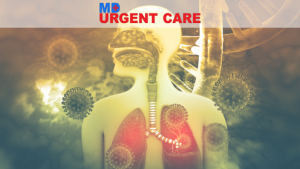Allergies cover a very broad range of triggers and symptoms, from food allergies and environmental allergies to hives and life-threatening anaphylaxis.
Understanding allergies is the first step in learning how to manage them. And the best way to begin understanding allergies is with accurate medical information and first-hand experiences like MD Urgent Care’s Physicians and Medical Team have.
That’s what you’ll find in this blog. We stand out for our commitment to educating, inspiring, and empowering those who need it most.
When somebody is allergic to something the immune system of that person gets confused and thinks that the substance is detrimental to the body. The substances causing allergic reactions are known as allergens. The body produces antibodies to protect itself from these allergens. The antibodies make certain cells present in the system to let chemicals mix with the bloodstream and one of them is histamine. Every time one comes in contact with the same allergen, an allergic reaction is produced in the body.
Allergic reactions can range from mild symptoms like a runny nose to more severe ones such as difficulty in breathing. Teenagers suffering from asthma often have an allergic reaction to colds and getting asthma attacks is another example of allergies. Allergic reactions in very rare cases also produce severe reactions known as anaphylaxis. Some reactions are delayed by as much as four hours after exposure.
Some of the common allergens include food, airborne particles, insect bite and sting, medicines, chemicals, etc. Some adolescents are also allergic to certain antibiotic medicines. Allergists usually treat allergic problems. The best way to treat allergies is to completely avoid the substances that cause allergies. However, certain medications and injections are also available to treat allergies. for more details ( Web MD-better information better health)
Below is some advice from MD Urgent Care’s Physicians on Do’s and Don’ts:
One can follow certain things to avoid allergies like people who have food allergies that should contain peanuts and any food containing the smallest amount of peanuts. Also, avoid using cosmetics that contain chemicals allergic to the skin. One can also avoid airborne allergies by keeping pets in restricted areas and away from bedrooms. Replace carpets and rugs from time to time. Avoid keeping things that accumulate dust. And also clean the room and house frequently.
We are open 7 days/week. Call us Merrillville 219-487-5773 and Highland:- 219-513-8677, book online at www.mdurgentcare.us, or walk-in!




